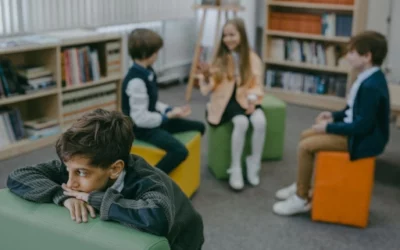Summer is a time for relaxation, physical activity, and unstructured time. Yet, parents and educators may also wonder whether students experience the “summer slide” — a decline in academic skills due to the long break.
This concern is especially important for students who may be struggling academically or may have fallen behind their peers during the school year.
Regardless of your situation, you can help your child maintain and even enhance their reading and math skills over the summer — while keeping it fun. This guide will provide practical and enjoyable ways to keep your child’s brain engaged while allowing them to enjoy their well-deserved break.
What is the “summer slide”?
The “summer slide” refers to the possibility that students may lose some of their academic gains over the summer break, especially in reading and math.
Do students lose learning over the summer?
Research is mixed on whether children forget what they’ve learned over their summer vacation [1].
Some early studies suggest summer learning loss can be significant, with some students losing about two months of reading skills and 2.6 months of math skills before the next school year. However, some of this research has been called into question due to outdated studies with potentially flawed methods [2].
Recent research using more modern testing approaches are also mixed on the magnitude of potential learning loss in math and reading in the summertime [3].
Overall, based on current research, it’s difficult to say whether the “summer slide” can have a severe or trivial impact. Additionally, the variability in research results makes it challenging to determine if some groups are more vulnerable to summer learning loss than others.
Should parents be concerned about the “summer slide”?
This debate about whether students lose academic progress over the summer can be confusing for parents.
Many parents are left wondering whether they should let their child relax over the summer or enroll them in academic classes or summer camps. And how much of their summertime should be focused on academics?
Consider the summer months as a time to make learning fun.
Summer can be a mix of unstructured activities and learning. For instance, let them focus on topics they are interested in so they enjoy learning. And look for opportunities in everyday activities to help reinforce academic skills.
You don’t have to make them work on math worksheets or vocabulary lists. Summertime learning doesn’t have to look like school, unless that’s what your child enjoys.
Instead, it’s an opportunity for you and your child to genuinely explore topics of interest. You can find plenty of ways to help them practice math and reading skills throughout the day without the structure of a classroom.
10 Fun ways to continue learning over the summer
Your child doesn’t have to attend a formal summer academic camp, summer school, or classes to continue learning over the summer, although for some struggling learners that may be appropriate too. Here are some easy ways to help your student maintain their math and reading skills over the summer.
1. Create a summer reading routine
Maintain reading skills by reading consistently throughout the summer holiday. Ideally, set aside a specific time for reading each day, such as after dinner or before bedtime, so it becomes a habit. Let your child select the book they want to read or have read to them. You also don’t have to read for a long amount of time. Aim for 20 to 30 minutes. But you can also break this up throughout the day, especially if your child struggles with reading.
The goal is to make reading fun, especially if your child doesn’t enjoy reading. So don’t set so many rules that reading feels like a punishment.
Additionally, you can:
- Read together, whether you’re reading to your child or each reading in the same room.
- Have an older child read to a younger sibling or family member.
- Explore local volunteer programs that allow children and teens to read to animals in an animal shelter.
- Listen to audiobooks together.
- Join a library or bookstore summer reading challenge.
- Join a book club or create one with your child’s friends to make reading a social activity your child will enjoy.
- Keep various reading materials available, such as books, magazines, and word puzzles.
2. Visit your local library regularly
Make regular trips to your local library so your child can pick out books that they want to read, even if it’s below their grade level. Additionally, let them explore the different sections of the library. They may discover a new area of interest.
Summer programs at the library are also a great way to explore new concepts, dive deeper into topics that interest them, and support their reading and math skills.
3. Keep writing materials available
Writing can improve your child’s reading skills and enhance creative thinking. But if your child doesn’t enjoy writing, look for ways to make it fun.
You can:
- Get some fun writing tools, like special pencils, pens with unusual ink, or a special writing pad or journal.
- See if your child is interested in keeping a journal or creating a scrapbook.
- Create a comic or story together or separately, then share it with family.
- Let them write the weekly grocery list.
- Look for volunteer opportunities that encourage students to write letters to active military members or elderly individuals in your community.
4. Have a regular game night
Spend time together as a family with a weekly game night. Board games, card games, and dice games can provide ample opportunities for practicing reading, math, and critical thinking skills. Plus, it’s a wonderful way to bond together as a family.
If your child or children are overly competitive, you can look for cooperative board games that encourage everyone to work together in order to win.
5. Cook or bake together
Cooking and baking provide a number of ways to incorporate reading and math activities, including measuring, sequencing, counting, reading, and more.
If they’re old enough, have your child read the recipe and guide each step. For younger children, point to the different steps as you read it to them. Let your child measure ingredients, and if they’re old enough, consider asking them to double or halve a recipe.
6. Visit local museums, science centers, or outdoor learning places
Enjoy time as a family while exploring local museums and activities. Look for places that your child finds interesting, whether it involves art, science, animals, or the outdoors. Some places may even offer special summer experiences, like science camps or summer art classes.
No matter where you visit, there will be opportunities to read about exhibits, engage in hands-on activities, and talk together about what you’re experiencing.
7. Look for learning opportunities on a walk or trip to your local park
You can also turn trips to the local park or walks around your neighborhood into learning opportunities. For instance, create a scavenger hunt where your child has to find a list of items. Or ask a younger child to count all the flowers they see or to find five small rocks, two medium-sized rocks, and one large rock.
8. Create crafts, use building toys, or other DIY projects
Crafts, building toys, and DIY projects are fun ways to spark your child’s creativity and reinforce math and reading skills. For instance, building kits, sewing projects, and art-focused projects may require reading, comprehension, following instructions, measuring materials, counting, spatial thinking, angles, problem-solving, and more. You can find age-appropriate craft and DIY ideas from the internet that fit your child’s interests.
Building toys like Lego, building blocks, Play-Doh, or household items also involve a variety of skills, including creative thinking, planning, sequencing, math, and reading. Plus, your child will enjoy playing with what they created.
9. Keep sports statistics
For kids and teens who love sports, creating and following sports statistics can be an effective way to engage them in math while keeping it fun. For instance, your child or teen may enjoy keeping statistics on their favorite sports team or player. You can watch games together and talk about the different statistics they’re tracking, why it’s helpful to know, and how to calculate the different statistics.
You can take it a step further by asking them questions that reinforce the learning, getting them thinking critically, and making real-world connections. For instance, if they love baseball, you can ask questions like: what happens to a person’s batting average if they strike out two times in a row, or what can you compare to a 90 mph fastball?
10. Go grocery shopping together
Grocery shopping provides a number of opportunities to reinforce math and reading skills. For instance, you can have your child:
- Assist with planning a meal
- Write the grocery list
- Take the lead at the store, reading signs, and finding the items on your list
- Calculate the cost using a calculator as you add items from the cart
- Compare multiple items, sizes, quantities, or brands to determine which is the best deal
- Count the number of items in your cart
- Create a budget
Summertime learning doesn’t have to feel like a chore
Summer is all about balance. While it’s important to keep math and reading skills sharp, it’s also essential to allow your child or teen time to unwind, have unstructured time, and enjoy their break.
You can help avoid the “summer slide” by blending fun educational activities into your summer plans that don’t feel like traditional learning. And encourage your child or teen to explore what interests them.
Sources
- Pappas, Stephanie. (July 10, 2023). School’s Out. Should You Worry About the ‘Summer Slide’? (Accessed May 2024)
- Von Hippel, P. T. (June 4, 2019). Is Summer Learning Loss Real? How I lost faith in one of education research’s classic results. Education Next, 9-14 (Accessed May 2024)
- Kuhfeld, M. & Lewis, K. (January 30, 2023). Is summer learning loss real, and does it widen test score gaps by family income? (Accessed May 2024)







